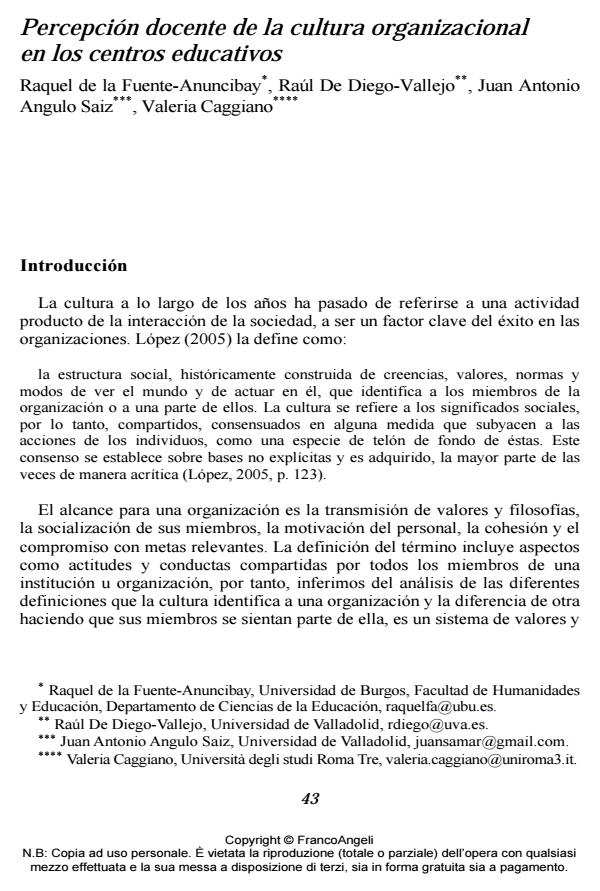Percepción docente de la cultura organizacional en los centros educativos
Titolo Rivista CADMO
Autori/Curatori Raquel de la Fuente-Anuncibay, Raùl De Diego-Vallejo, Juan Antonio Angulo Saiz, Valeria Caggiano
Anno di pubblicazione 2016 Fascicolo 2016/1
Lingua Spagnolo Numero pagine 14 P. 43-56 Dimensione file 188 KB
DOI 10.3280/CAD2016-001006
Il DOI è il codice a barre della proprietà intellettuale: per saperne di più
clicca qui
Qui sotto puoi vedere in anteprima la prima pagina di questo articolo.
Se questo articolo ti interessa, lo puoi acquistare (e scaricare in formato pdf) seguendo le facili indicazioni per acquistare il download credit. Acquista Download Credits per scaricare questo Articolo in formato PDF

FrancoAngeli è membro della Publishers International Linking Association, Inc (PILA), associazione indipendente e non profit per facilitare (attraverso i servizi tecnologici implementati da CrossRef.org) l’accesso degli studiosi ai contenuti digitali nelle pubblicazioni professionali e scientifiche.
The culture throughout the years has been to refer to a product of the interaction of society, to be a key success factor in organizations activity. The importance of this concept for an organization is the transmission of values and philosophies, socialization of its members, staff motivation, cohesion and commitment to important goals. The aim of this study is to analyze aspects of organizational culture building on the perception of teachers in Spanish schools. We performed a study on variables related to organizational culture drawing on the Icoe inventory, based on a sample of 52 schools and 661 teachers. The statistical analyses, the factor analysis and Anova are perfomed through SPSS 21. The results obtained indicate that teachers perceive their center’s organizational culture quite positive and homogeneaous, feeling a good social environment, communication, relationships and integration, work commitment, impartiality, equity and recognition. The existence of differences in scores by type of center and episodic knowledge of severe physical or verbal violence. By contrasts, they are less significant in terms of age and experience, the size of the center, gender and type of population. Learning a center’s culture starting from participants’ perceptions, gives us an approximate idea of what is ideologically shared about a center and, this analysis helps us to reflect on the strength or weakness of the existing culture in schools to address the challenges of education in today’s society.
Parole chiave:School organization, beliefs, organizational culture, secondary education.
- Liderazgo educativo en centros de secundaria. Relación con la percepción y la satisfacción laboral del profesorado Raquel de la Fuente-Anuncibay, Jerónimo González-Bernal, Raúl de Diego-Vallejo, Valeria Caggiano, in CADMO 2/2018 pp.51
DOI: 10.3280/CAD2017-002006 - Cultura organizativa digital y coaching educativo digital en línea: un estudio de metaanálisis en el ámbito de las Ciencias Sociales Verónica Baquerizo Álava, Esther Fernández-Márquez, María Belén Morales Cevallos, Eloy López Meneses, in Innoeduca. International Journal of Technology and Educational Innovation /2024 pp.81
DOI: 10.24310/ijtei.101.2024.18124
Raquel de la Fuente-Anuncibay, Raùl De Diego-Vallejo, Juan Antonio Angulo Saiz, Valeria Caggiano, Percepción docente de la cultura organizacional en los centros educativos in "CADMO" 1/2016, pp 43-56, DOI: 10.3280/CAD2016-001006